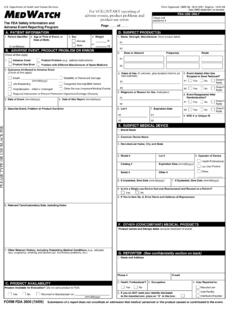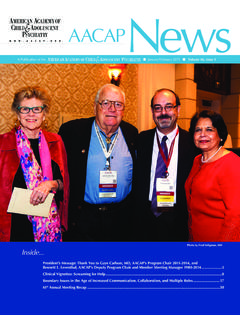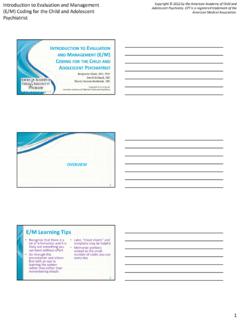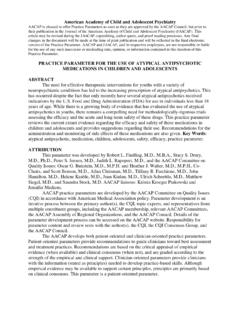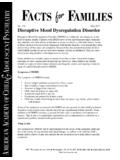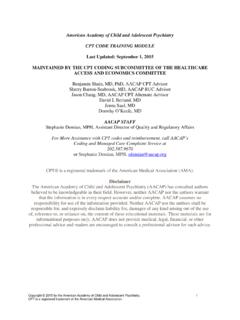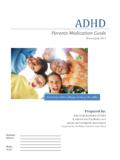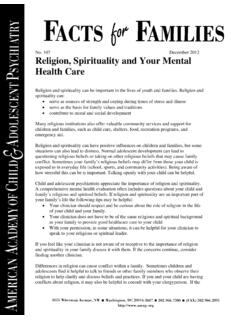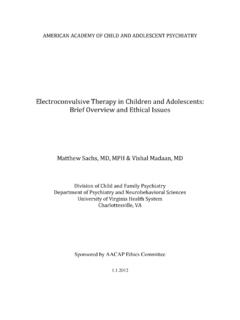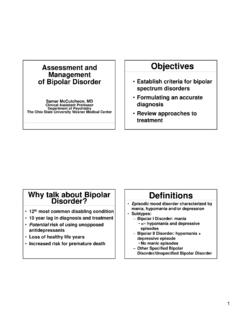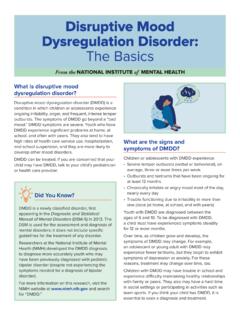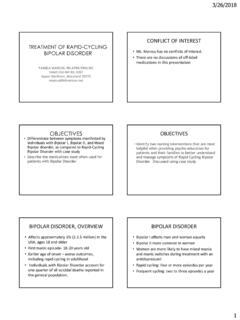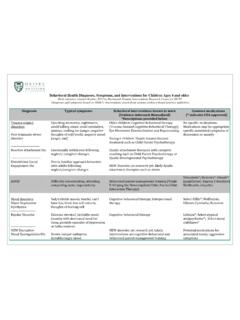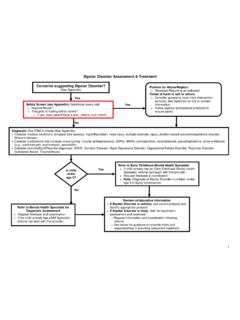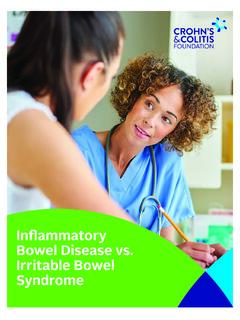Transcription of Depression: Parents’ Medication Guide
1 depression : parents '. Medication Guide depression parents ' Medication Guide Work Group CHAIR: Graham J. Emslie, MD. MEMBERS: Teri Brister, PhD, LPC, Representative from National Alliance on Mental Illness Meredith Chapman, MD. Mina K. Dulcan, MD. Cathryn A. Galanter, MD. Jessica M. Jones, MA, LPA. Beth Kennard, PsyD. Jerry Pavlon-Blum, Representative from depression and Bipolar Support Alliance Theodore A. Petti, MD, MPH. Adelaide S. Robb, MD. Timothy E. Wilens, MD. STAFF: Carmen J. Head, MPH, CHES, Director, Research, Development, & Workforce Sarah Hellwege, MEd, Assistant Director, Research, Training, & Education CONSULTANT: Esha Gupta, Medical Science Writer The American Academy of Child and Adolescent Psychiatry promotes the healthy development of children, adolescents, and families through advocacy, education, and research. Child and adolescent psychiatrists are the leading physician authority on children's mental health.
2 2018 American Academy of Child and Adolescent Psychiatry, all rights reserved. Table of Contents Causes and Diagnosing depression in Children and 6. Suicide and Youth with Treating 8. Taking Medication for Psychosocial Treatments for Other and/or Unproven Treatments for Helping the Depressed Introduction T. he original parents Medical Guide on depression is a type of mood disorder that can treating depression was published in damage relationships among family members 2005, and a revision was published in and friends, harm school performance, 2010, through collaboration by the American and limit other educational opportunities. Academy of Child and Adolescent Psychiatry depression can negatively affect eating, (AACAP) and the American Psychiatric sleeping, and physical activity. Because it Association (APA). The current revision has can result in so many health problems, it is been updated to include new research on important to recognize the signs of depression effective treatments for child and adolescent and get the right treatment .
3 When depression depression . The goal of this Guide is to help is treated successfully, most children can get parents make informed decisions about back on track with their lives. getting the best care for a child or adolescent with depression . Although depression can occur in young children, it is much more common in What is depression ? adolescents (youth ages 12 18 years). depression is a serious illness that can affect depression before children reach puberty almost every part of a young person's life occurs equally in boys and girls. After puberty, and significantly impact his or her family. depression is more common in girls. 4 depression : parents ' Medication Guide Causes and Symptoms Why does my child Difficulty falling asleep and/or staying irritable or cranky mood asleep or sleeping too much have depression ? Boredom, giving up favorite activities, We don't fully understand all the Restlessness, unable to sit still (referred toys, and interests causes of depression ; we think it's a to as psychomotor agitation), or combination of genetics (inherited traits) being slowed down (referred to as Failure to gain weight as expected and environmental factors (events and psychomotor slowing).)
4 Surroundings). There is no single cause. Delays in going to sleep, refusal to wake up for school or get out of bed Stressors or events that cause a stressful Fatigue or loss of energy response and genetic factors can cause depression . Stressors can be triggers Feelings of worthlessness or excessive Difficulty sitting still or very or inappropriate feelings of guilt slowed movements that result from pediatric illnesses and diseases, such as viral infections; diseases Tired all the time, feeling lazy . of the thyroid and endocrine system; head Difficulties in concentrating or making decisions injury; epilepsy; and heart, kidney, and lung Self-critical or blaming self diseases. A family history of depression for everything Constant thoughts of death, suicidal is a major genetic factor; a child can be thinking, or a suicide attempt more prone to becoming depressed if Decline in school performance, failing a parent or sibling has been diagnosed According to the Diagnostic and grades or classes with depression .
5 Stressors in everyday Statistical Manual of Mental Disorders life also contribute to the development (DSM-5), an episode of major depression Frequent thoughts and discussion about death, giving away favorite belongings of depression , for example, the loss of a is characterized by 5 or more of these close loved one; parents frequently arguing, symptoms (with at least one of the separating, or divorcing; school changes; symptoms noted as a depressed and/ How do the symptoms of and family financial problems. Finally, or irritable mood or having reduced depression differ from developmental factors, such as learning interests or little pleasure) that have typical sadness? and language disabilities, are sometimes lasted for at least 2 weeks and affected It is normal for children and adolescents overlooked. Other mental illnesses and a child's performance at school, at to feel sad sometimes or be irritated symptoms, such as attention-deficit/ work, with family, or with friends.
6 In response to stressors. depression hyperactivity disorder (ADHD), anxiety, These symptoms are not caused by is different from occasional sadness. fears, and excessive shyness, in addition Medication , drug abuse, or alcohol and A child or adolescent with depression to not having opportunities to develop are not the result of another medical or has a significant change in their typical interests and show strengths and talents, mental illness. mood and interest level and is persistent can add to depression . (ie, most of the time for several weeks). The symptoms of major depressive Youth with depression show symptoms disorder (MDD) in youth and adults What are the symptoms that are significant enough to cause them are the same. However, the symptoms problems at home, at school, and/or with of depression ? of depression may look differently friends and family.
7 Youth with depression Depressed, sad, or irritable mood in children and adolescents than in may report that their symptoms are in adults. For example, children may have Significant loss of interest or pleasure difficulty expressing their sad mood response to a stressful or upsetting event, in activities or they may not know what caused them and may complain of headaches or to feel this way. stomachaches instead. Listed below are Significant weight loss, weight gain, or appetite changes other ways that depression may look differently in youth: depression : parents ' Medication Guide 5. Diagnosing depression in Children and Adolescents families. Child and adolescent psychiatry How is depression in children and training requires four years of medical school, adolescents diagnosed? at least three years of residency training in If you are concerned that your child is general psychiatry with adults, and two years depressed, it's important to discuss this of additional specialized training in treating with your child's doctor.
8 Your child's doctor children, adolescents and families. may recommend a thorough assessment. A thorough assessment includes getting A medical history and physical exam, as well as information about the degree and severity a detailed history of biologically related family of symptoms, psychosocial stressors and members, are also recommended to rule out or functioning from the child, parent, caregiver identify other co-existing medical and mental and/or guardian who lives with the child and health conditions that may require treatment . reports from the school. This assessment should be done by What other conditions can someone with experience in evaluating accompany depression ? children for mental illness, such as a child Up to 50% of children and adolescents diagnosed and adolescent psychiatrist. A child and with depression may have other mental health adolescent psychiatrist is a doctor who disorders, including bipolar disorder.
9 Children specializes in the diagnosis and treatment of and adolescents with depression may also have disorders of thinking, feeling and/or behavior anxiety, ADHD, and learning differences or be at affecting children, adolescents and their risk of abusing drugs or alcohol. If you are concerned that your child is depressed, it's important to discuss this with your child's doctor. 6 depression : parents ' Medication Guide Suicide and Youth with depression Y. outh with depression are at diseases in children and adolescents. of suicidal thoughts and/or behaviors in increased risk for suicide attempts More adolescents and young adults die youth who take antidepressants. There and suicide. It is important to from suicide than from cancer, heart was no record of completed suicides in their ask your child whether they are having disease, AIDS, birth defects, stroke, review of over 2,000 youth who were treated thoughts about hurting themselves.
10 If pneumonia, influenza, and chronic lung with antidepressant medications, but the your child expresses suicidal thoughts, disease combined. rate of suicidal thinking/behavior (including this is an opportunity to discuss actual suicide attempts) was twice as high taking precautions to make the child's in youth taking medications (4%) than those What factors other than environment safe. Talking with your child taking placebo or sugar pills (2%). about suicide does not cause suicide, but depression may increase it does let your child know that you are suicide risk? Treating underlying depression in concerned and that you want to know Additional risk factors for suicide include youth who are thinking about suicide having a family member who died by is an important strategy, because whether they have any thoughts about it. suicide or knowing someone else who antidepressant medications improve died by suicide.
